Arden University: Dissertation Ethical Approval Form - Healthcare Mgmt
VerifiedAdded on 2022/08/22
|9
|2941
|11
Report
AI Summary
This document is an ethical approval form for a dissertation focusing on the evaluation of poor management of Type 2 diabetes on the health and wellbeing of adults aged 50 to 65 years old in the UK. The form details the student's information, program details, and the proposed research project, including a project summary, research method, data collection method, and ethical considerations. The research employs an interpretivism philosophy and explanatory design using secondary data collection through books, journals, and websites. The study aims to assess the impact of diabetes and identify management strategies. The form also covers inclusion and exclusion criteria, research outcomes, and declarations regarding human participant involvement. Key question checks are included to ensure ethical compliance, addressing aspects like information sheets, consent forms, data security, and sensitive data handling.
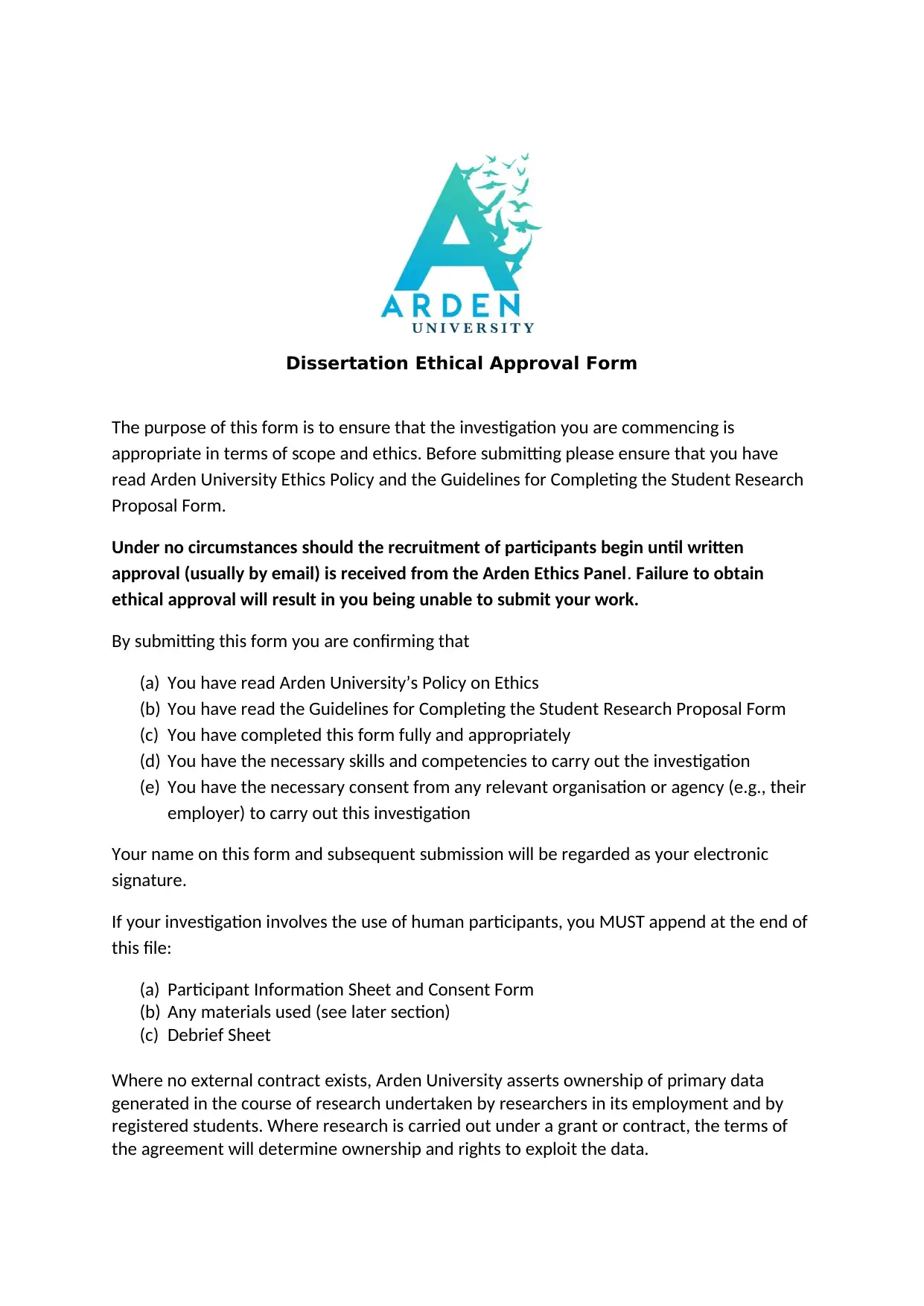
Dissertation Ethical Approval Form
The purpose of this form is to ensure that the investigation you are commencing is
appropriate in terms of scope and ethics. Before submitting please ensure that you have
read Arden University Ethics Policy and the Guidelines for Completing the Student Research
Proposal Form.
Under no circumstances should the recruitment of participants begin until written
approval (usually by email) is received from the Arden Ethics Panel. Failure to obtain
ethical approval will result in you being unable to submit your work.
By submitting this form you are confirming that
(a) You have read Arden University’s Policy on Ethics
(b) You have read the Guidelines for Completing the Student Research Proposal Form
(c) You have completed this form fully and appropriately
(d) You have the necessary skills and competencies to carry out the investigation
(e) You have the necessary consent from any relevant organisation or agency (e.g., their
employer) to carry out this investigation
Your name on this form and subsequent submission will be regarded as your electronic
signature.
If your investigation involves the use of human participants, you MUST append at the end of
this file:
(a) Participant Information Sheet and Consent Form
(b) Any materials used (see later section)
(c) Debrief Sheet
Where no external contract exists, Arden University asserts ownership of primary data
generated in the course of research undertaken by researchers in its employment and by
registered students. Where research is carried out under a grant or contract, the terms of
the agreement will determine ownership and rights to exploit the data.
The purpose of this form is to ensure that the investigation you are commencing is
appropriate in terms of scope and ethics. Before submitting please ensure that you have
read Arden University Ethics Policy and the Guidelines for Completing the Student Research
Proposal Form.
Under no circumstances should the recruitment of participants begin until written
approval (usually by email) is received from the Arden Ethics Panel. Failure to obtain
ethical approval will result in you being unable to submit your work.
By submitting this form you are confirming that
(a) You have read Arden University’s Policy on Ethics
(b) You have read the Guidelines for Completing the Student Research Proposal Form
(c) You have completed this form fully and appropriately
(d) You have the necessary skills and competencies to carry out the investigation
(e) You have the necessary consent from any relevant organisation or agency (e.g., their
employer) to carry out this investigation
Your name on this form and subsequent submission will be regarded as your electronic
signature.
If your investigation involves the use of human participants, you MUST append at the end of
this file:
(a) Participant Information Sheet and Consent Form
(b) Any materials used (see later section)
(c) Debrief Sheet
Where no external contract exists, Arden University asserts ownership of primary data
generated in the course of research undertaken by researchers in its employment and by
registered students. Where research is carried out under a grant or contract, the terms of
the agreement will determine ownership and rights to exploit the data.
Paraphrase This Document
Need a fresh take? Get an instant paraphrase of this document with our AI Paraphraser
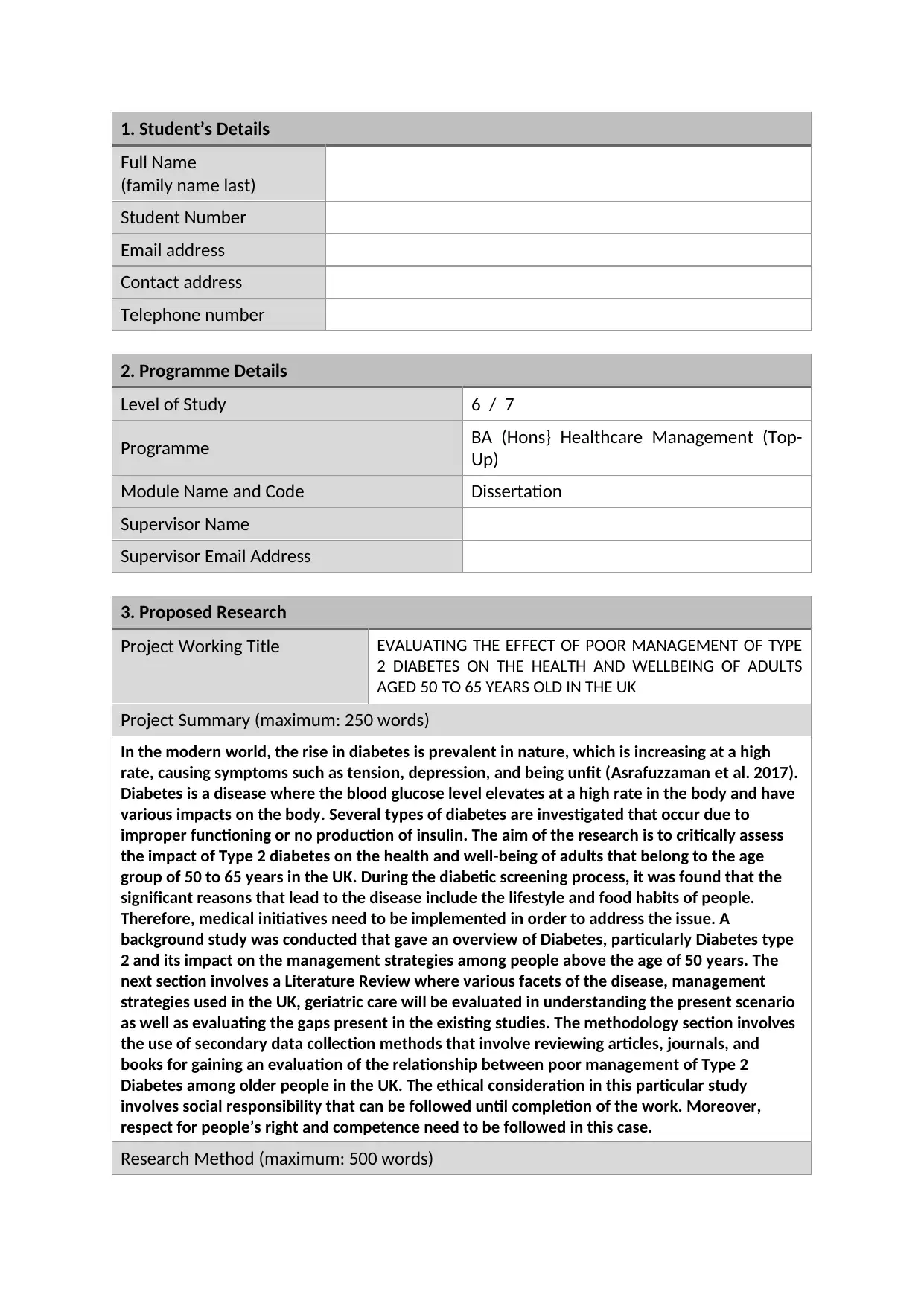
1. Student’s Details
Full Name
(family name last)
Student Number
Email address
Contact address
Telephone number
2. Programme Details
Level of Study 6 / 7
Programme BA (Hons} Healthcare Management (Top-
Up)
Module Name and Code Dissertation
Supervisor Name
Supervisor Email Address
3. Proposed Research
Project Working Title EVALUATING THE EFFECT OF POOR MANAGEMENT OF TYPE
2 DIABETES ON THE HEALTH AND WELLBEING OF ADULTS
AGED 50 TO 65 YEARS OLD IN THE UK
Project Summary (maximum: 250 words)
In the modern world, the rise in diabetes is prevalent in nature, which is increasing at a high
rate, causing symptoms such as tension, depression, and being unfit (Asrafuzzaman et al. 2017).
Diabetes is a disease where the blood glucose level elevates at a high rate in the body and have
various impacts on the body. Several types of diabetes are investigated that occur due to
improper functioning or no production of insulin. The aim of the research is to critically assess
the impact of Type 2 diabetes on the health and well-being of adults that belong to the age
group of 50 to 65 years in the UK. During the diabetic screening process, it was found that the
significant reasons that lead to the disease include the lifestyle and food habits of people.
Therefore, medical initiatives need to be implemented in order to address the issue. A
background study was conducted that gave an overview of Diabetes, particularly Diabetes type
2 and its impact on the management strategies among people above the age of 50 years. The
next section involves a Literature Review where various facets of the disease, management
strategies used in the UK, geriatric care will be evaluated in understanding the present scenario
as well as evaluating the gaps present in the existing studies. The methodology section involves
the use of secondary data collection methods that involve reviewing articles, journals, and
books for gaining an evaluation of the relationship between poor management of Type 2
Diabetes among older people in the UK. The ethical consideration in this particular study
involves social responsibility that can be followed until completion of the work. Moreover,
respect for people’s right and competence need to be followed in this case.
Research Method (maximum: 500 words)
Full Name
(family name last)
Student Number
Email address
Contact address
Telephone number
2. Programme Details
Level of Study 6 / 7
Programme BA (Hons} Healthcare Management (Top-
Up)
Module Name and Code Dissertation
Supervisor Name
Supervisor Email Address
3. Proposed Research
Project Working Title EVALUATING THE EFFECT OF POOR MANAGEMENT OF TYPE
2 DIABETES ON THE HEALTH AND WELLBEING OF ADULTS
AGED 50 TO 65 YEARS OLD IN THE UK
Project Summary (maximum: 250 words)
In the modern world, the rise in diabetes is prevalent in nature, which is increasing at a high
rate, causing symptoms such as tension, depression, and being unfit (Asrafuzzaman et al. 2017).
Diabetes is a disease where the blood glucose level elevates at a high rate in the body and have
various impacts on the body. Several types of diabetes are investigated that occur due to
improper functioning or no production of insulin. The aim of the research is to critically assess
the impact of Type 2 diabetes on the health and well-being of adults that belong to the age
group of 50 to 65 years in the UK. During the diabetic screening process, it was found that the
significant reasons that lead to the disease include the lifestyle and food habits of people.
Therefore, medical initiatives need to be implemented in order to address the issue. A
background study was conducted that gave an overview of Diabetes, particularly Diabetes type
2 and its impact on the management strategies among people above the age of 50 years. The
next section involves a Literature Review where various facets of the disease, management
strategies used in the UK, geriatric care will be evaluated in understanding the present scenario
as well as evaluating the gaps present in the existing studies. The methodology section involves
the use of secondary data collection methods that involve reviewing articles, journals, and
books for gaining an evaluation of the relationship between poor management of Type 2
Diabetes among older people in the UK. The ethical consideration in this particular study
involves social responsibility that can be followed until completion of the work. Moreover,
respect for people’s right and competence need to be followed in this case.
Research Method (maximum: 500 words)
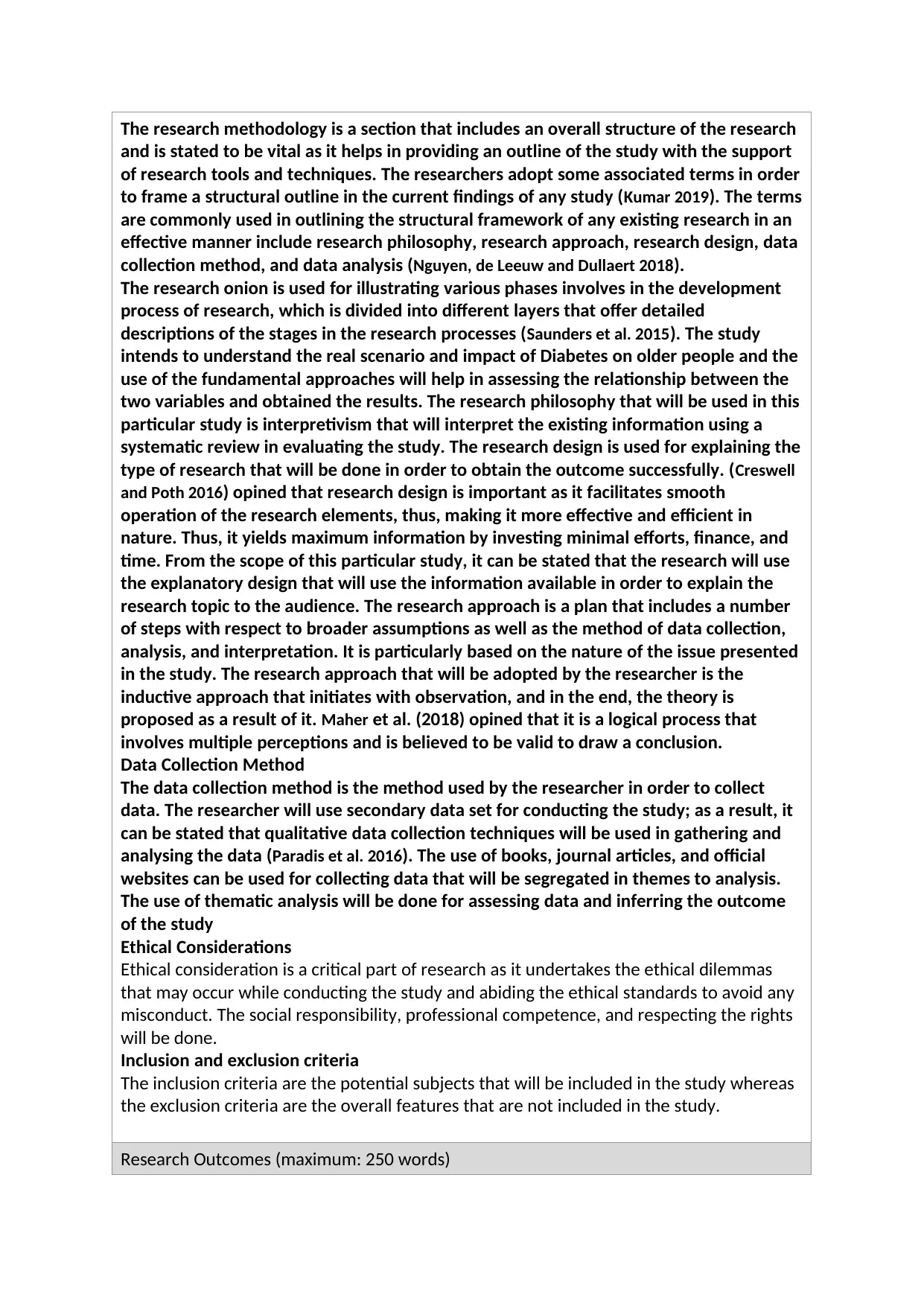
The research methodology is a section that includes an overall structure of the research
and is stated to be vital as it helps in providing an outline of the study with the support
of research tools and techniques. The researchers adopt some associated terms in order
to frame a structural outline in the current findings of any study (Kumar 2019). The terms
are commonly used in outlining the structural framework of any existing research in an
effective manner include research philosophy, research approach, research design, data
collection method, and data analysis (Nguyen, de Leeuw and Dullaert 2018).
The research onion is used for illustrating various phases involves in the development
process of research, which is divided into different layers that offer detailed
descriptions of the stages in the research processes (Saunders et al. 2015). The study
intends to understand the real scenario and impact of Diabetes on older people and the
use of the fundamental approaches will help in assessing the relationship between the
two variables and obtained the results. The research philosophy that will be used in this
particular study is interpretivism that will interpret the existing information using a
systematic review in evaluating the study. The research design is used for explaining the
type of research that will be done in order to obtain the outcome successfully. (Creswell
and Poth 2016) opined that research design is important as it facilitates smooth
operation of the research elements, thus, making it more effective and efficient in
nature. Thus, it yields maximum information by investing minimal efforts, finance, and
time. From the scope of this particular study, it can be stated that the research will use
the explanatory design that will use the information available in order to explain the
research topic to the audience. The research approach is a plan that includes a number
of steps with respect to broader assumptions as well as the method of data collection,
analysis, and interpretation. It is particularly based on the nature of the issue presented
in the study. The research approach that will be adopted by the researcher is the
inductive approach that initiates with observation, and in the end, the theory is
proposed as a result of it. Maher et al. (2018) opined that it is a logical process that
involves multiple perceptions and is believed to be valid to draw a conclusion.
Data Collection Method
The data collection method is the method used by the researcher in order to collect
data. The researcher will use secondary data set for conducting the study; as a result, it
can be stated that qualitative data collection techniques will be used in gathering and
analysing the data (Paradis et al. 2016). The use of books, journal articles, and official
websites can be used for collecting data that will be segregated in themes to analysis.
The use of thematic analysis will be done for assessing data and inferring the outcome
of the study
Ethical Considerations
Ethical consideration is a critical part of research as it undertakes the ethical dilemmas
that may occur while conducting the study and abiding the ethical standards to avoid any
misconduct. The social responsibility, professional competence, and respecting the rights
will be done.
Inclusion and exclusion criteria
The inclusion criteria are the potential subjects that will be included in the study whereas
the exclusion criteria are the overall features that are not included in the study.
Research Outcomes (maximum: 250 words)
and is stated to be vital as it helps in providing an outline of the study with the support
of research tools and techniques. The researchers adopt some associated terms in order
to frame a structural outline in the current findings of any study (Kumar 2019). The terms
are commonly used in outlining the structural framework of any existing research in an
effective manner include research philosophy, research approach, research design, data
collection method, and data analysis (Nguyen, de Leeuw and Dullaert 2018).
The research onion is used for illustrating various phases involves in the development
process of research, which is divided into different layers that offer detailed
descriptions of the stages in the research processes (Saunders et al. 2015). The study
intends to understand the real scenario and impact of Diabetes on older people and the
use of the fundamental approaches will help in assessing the relationship between the
two variables and obtained the results. The research philosophy that will be used in this
particular study is interpretivism that will interpret the existing information using a
systematic review in evaluating the study. The research design is used for explaining the
type of research that will be done in order to obtain the outcome successfully. (Creswell
and Poth 2016) opined that research design is important as it facilitates smooth
operation of the research elements, thus, making it more effective and efficient in
nature. Thus, it yields maximum information by investing minimal efforts, finance, and
time. From the scope of this particular study, it can be stated that the research will use
the explanatory design that will use the information available in order to explain the
research topic to the audience. The research approach is a plan that includes a number
of steps with respect to broader assumptions as well as the method of data collection,
analysis, and interpretation. It is particularly based on the nature of the issue presented
in the study. The research approach that will be adopted by the researcher is the
inductive approach that initiates with observation, and in the end, the theory is
proposed as a result of it. Maher et al. (2018) opined that it is a logical process that
involves multiple perceptions and is believed to be valid to draw a conclusion.
Data Collection Method
The data collection method is the method used by the researcher in order to collect
data. The researcher will use secondary data set for conducting the study; as a result, it
can be stated that qualitative data collection techniques will be used in gathering and
analysing the data (Paradis et al. 2016). The use of books, journal articles, and official
websites can be used for collecting data that will be segregated in themes to analysis.
The use of thematic analysis will be done for assessing data and inferring the outcome
of the study
Ethical Considerations
Ethical consideration is a critical part of research as it undertakes the ethical dilemmas
that may occur while conducting the study and abiding the ethical standards to avoid any
misconduct. The social responsibility, professional competence, and respecting the rights
will be done.
Inclusion and exclusion criteria
The inclusion criteria are the potential subjects that will be included in the study whereas
the exclusion criteria are the overall features that are not included in the study.
Research Outcomes (maximum: 250 words)
⊘ This is a preview!⊘
Do you want full access?
Subscribe today to unlock all pages.

Trusted by 1+ million students worldwide
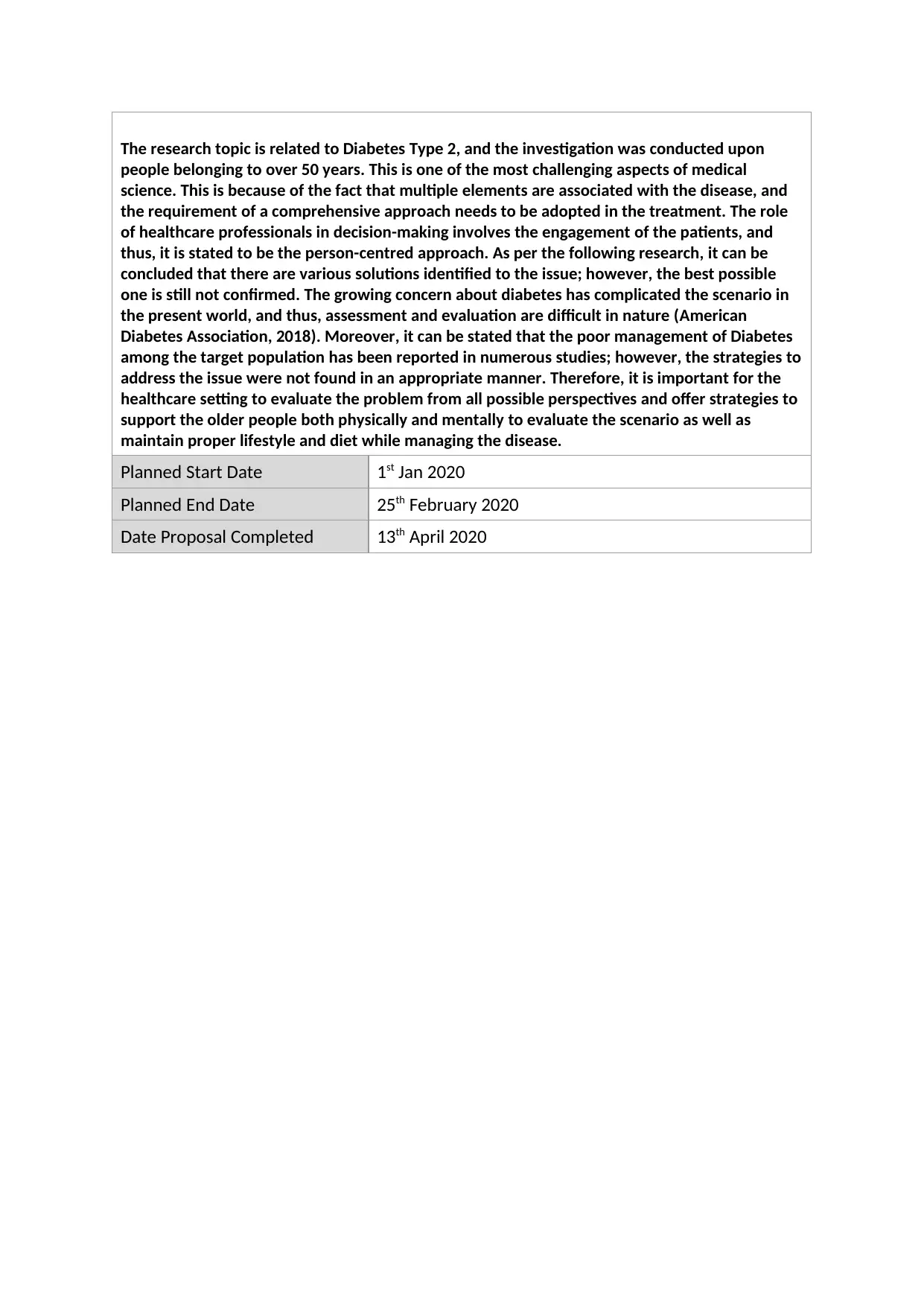
The research topic is related to Diabetes Type 2, and the investigation was conducted upon
people belonging to over 50 years. This is one of the most challenging aspects of medical
science. This is because of the fact that multiple elements are associated with the disease, and
the requirement of a comprehensive approach needs to be adopted in the treatment. The role
of healthcare professionals in decision-making involves the engagement of the patients, and
thus, it is stated to be the person-centred approach. As per the following research, it can be
concluded that there are various solutions identified to the issue; however, the best possible
one is still not confirmed. The growing concern about diabetes has complicated the scenario in
the present world, and thus, assessment and evaluation are difficult in nature (American
Diabetes Association, 2018). Moreover, it can be stated that the poor management of Diabetes
among the target population has been reported in numerous studies; however, the strategies to
address the issue were not found in an appropriate manner. Therefore, it is important for the
healthcare setting to evaluate the problem from all possible perspectives and offer strategies to
support the older people both physically and mentally to evaluate the scenario as well as
maintain proper lifestyle and diet while managing the disease.
Planned Start Date 1st Jan 2020
Planned End Date 25th February 2020
Date Proposal Completed 13th April 2020
people belonging to over 50 years. This is one of the most challenging aspects of medical
science. This is because of the fact that multiple elements are associated with the disease, and
the requirement of a comprehensive approach needs to be adopted in the treatment. The role
of healthcare professionals in decision-making involves the engagement of the patients, and
thus, it is stated to be the person-centred approach. As per the following research, it can be
concluded that there are various solutions identified to the issue; however, the best possible
one is still not confirmed. The growing concern about diabetes has complicated the scenario in
the present world, and thus, assessment and evaluation are difficult in nature (American
Diabetes Association, 2018). Moreover, it can be stated that the poor management of Diabetes
among the target population has been reported in numerous studies; however, the strategies to
address the issue were not found in an appropriate manner. Therefore, it is important for the
healthcare setting to evaluate the problem from all possible perspectives and offer strategies to
support the older people both physically and mentally to evaluate the scenario as well as
maintain proper lifestyle and diet while managing the disease.
Planned Start Date 1st Jan 2020
Planned End Date 25th February 2020
Date Proposal Completed 13th April 2020
Paraphrase This Document
Need a fresh take? Get an instant paraphrase of this document with our AI Paraphraser
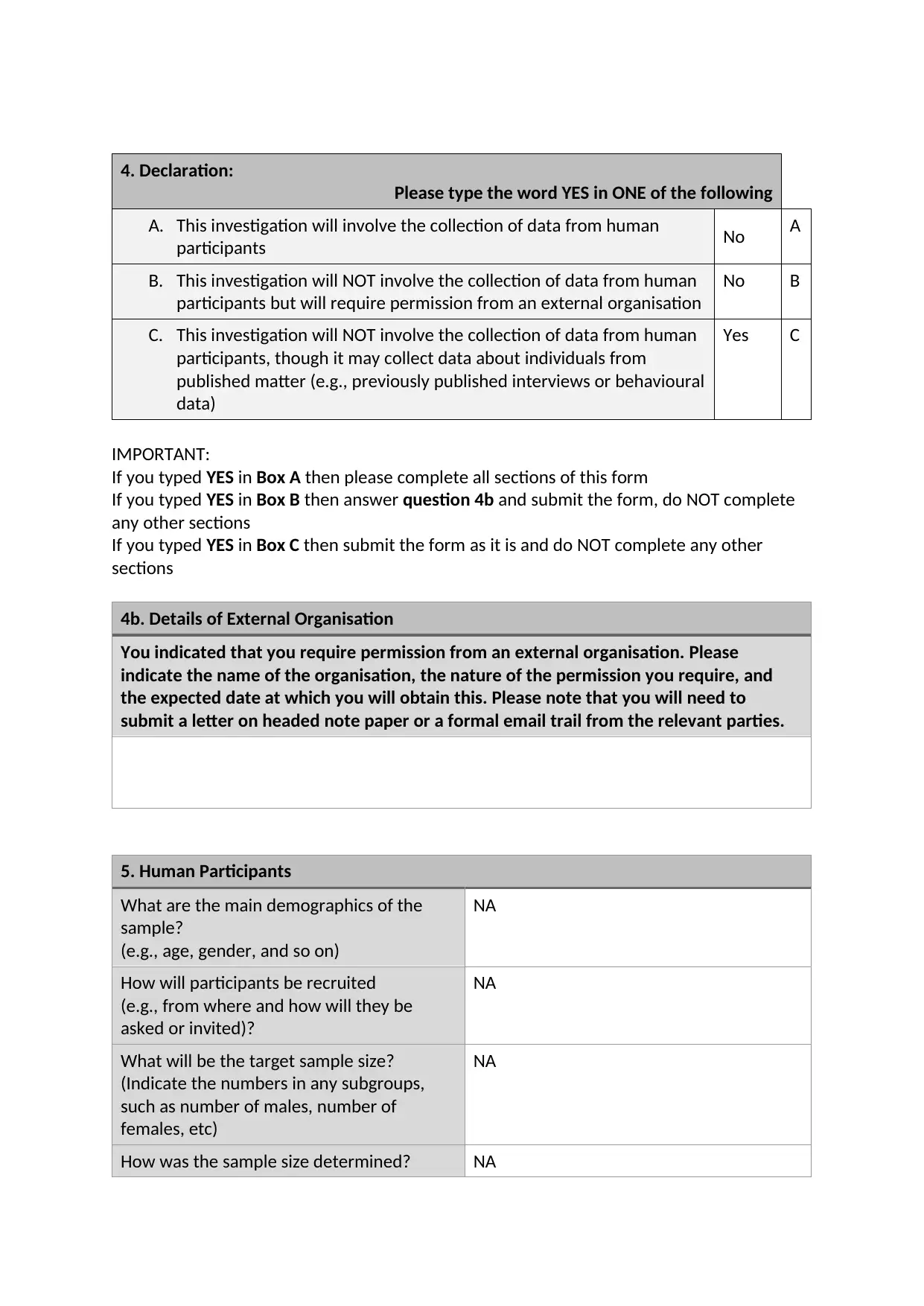
4. Declaration:
Please type the word YES in ONE of the following
A. This investigation will involve the collection of data from human
participants No A
B. This investigation will NOT involve the collection of data from human
participants but will require permission from an external organisation
No B
C. This investigation will NOT involve the collection of data from human
participants, though it may collect data about individuals from
published matter (e.g., previously published interviews or behavioural
data)
Yes C
IMPORTANT:
If you typed YES in Box A then please complete all sections of this form
If you typed YES in Box B then answer question 4b and submit the form, do NOT complete
any other sections
If you typed YES in Box C then submit the form as it is and do NOT complete any other
sections
4b. Details of External Organisation
You indicated that you require permission from an external organisation. Please
indicate the name of the organisation, the nature of the permission you require, and
the expected date at which you will obtain this. Please note that you will need to
submit a letter on headed note paper or a formal email trail from the relevant parties.
5. Human Participants
What are the main demographics of the
sample?
(e.g., age, gender, and so on)
NA
How will participants be recruited
(e.g., from where and how will they be
asked or invited)?
NA
What will be the target sample size?
(Indicate the numbers in any subgroups,
such as number of males, number of
females, etc)
NA
How was the sample size determined? NA
Please type the word YES in ONE of the following
A. This investigation will involve the collection of data from human
participants No A
B. This investigation will NOT involve the collection of data from human
participants but will require permission from an external organisation
No B
C. This investigation will NOT involve the collection of data from human
participants, though it may collect data about individuals from
published matter (e.g., previously published interviews or behavioural
data)
Yes C
IMPORTANT:
If you typed YES in Box A then please complete all sections of this form
If you typed YES in Box B then answer question 4b and submit the form, do NOT complete
any other sections
If you typed YES in Box C then submit the form as it is and do NOT complete any other
sections
4b. Details of External Organisation
You indicated that you require permission from an external organisation. Please
indicate the name of the organisation, the nature of the permission you require, and
the expected date at which you will obtain this. Please note that you will need to
submit a letter on headed note paper or a formal email trail from the relevant parties.
5. Human Participants
What are the main demographics of the
sample?
(e.g., age, gender, and so on)
NA
How will participants be recruited
(e.g., from where and how will they be
asked or invited)?
NA
What will be the target sample size?
(Indicate the numbers in any subgroups,
such as number of males, number of
females, etc)
NA
How was the sample size determined? NA
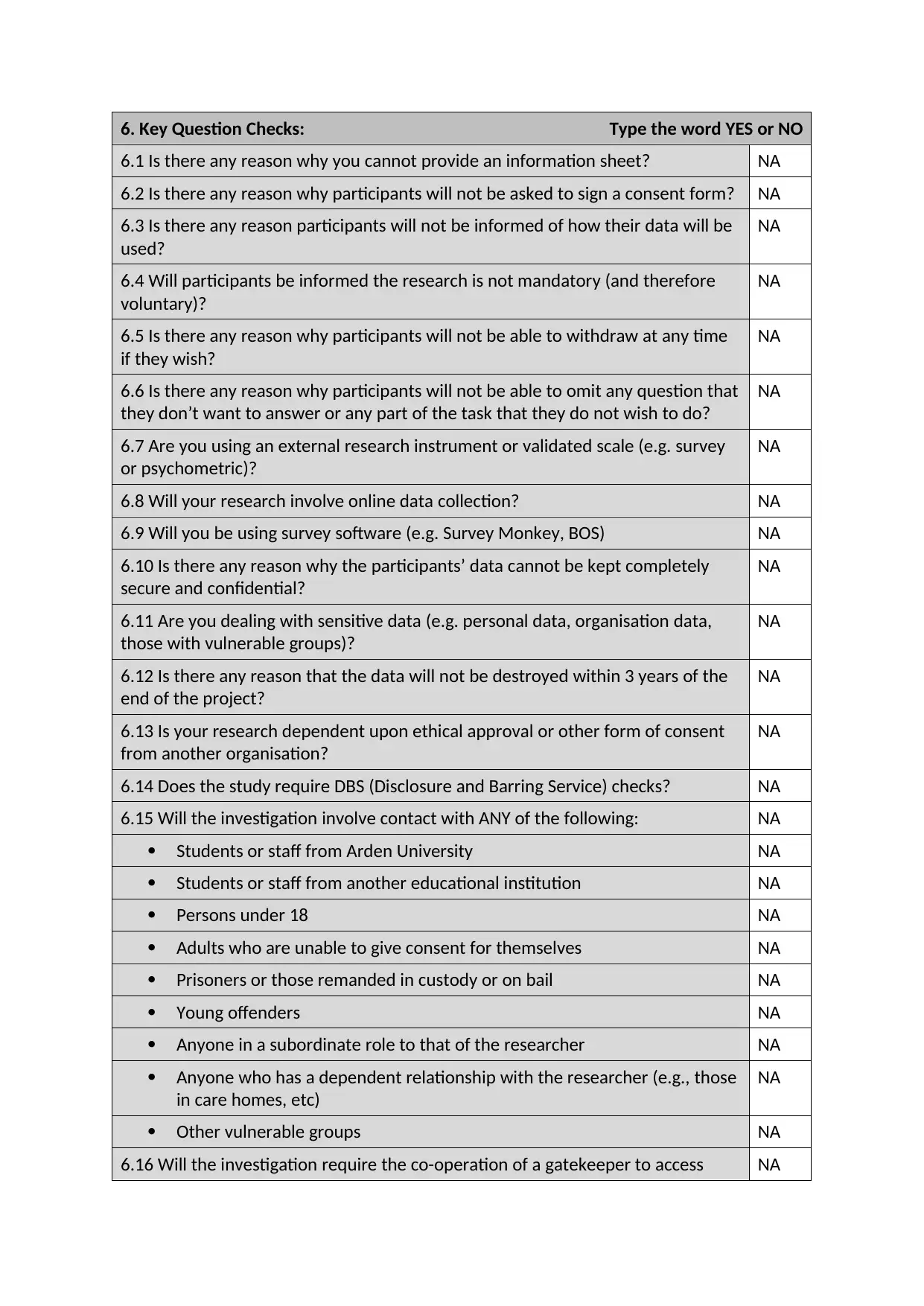
6. Key Question Checks: Type the word YES or NO
6.1 Is there any reason why you cannot provide an information sheet? NA
6.2 Is there any reason why participants will not be asked to sign a consent form? NA
6.3 Is there any reason participants will not be informed of how their data will be
used?
NA
6.4 Will participants be informed the research is not mandatory (and therefore
voluntary)?
NA
6.5 Is there any reason why participants will not be able to withdraw at any time
if they wish?
NA
6.6 Is there any reason why participants will not be able to omit any question that
they don’t want to answer or any part of the task that they do not wish to do?
NA
6.7 Are you using an external research instrument or validated scale (e.g. survey
or psychometric)?
NA
6.8 Will your research involve online data collection? NA
6.9 Will you be using survey software (e.g. Survey Monkey, BOS) NA
6.10 Is there any reason why the participants’ data cannot be kept completely
secure and confidential?
NA
6.11 Are you dealing with sensitive data (e.g. personal data, organisation data,
those with vulnerable groups)?
NA
6.12 Is there any reason that the data will not be destroyed within 3 years of the
end of the project?
NA
6.13 Is your research dependent upon ethical approval or other form of consent
from another organisation?
NA
6.14 Does the study require DBS (Disclosure and Barring Service) checks? NA
6.15 Will the investigation involve contact with ANY of the following: NA
Students or staff from Arden University NA
Students or staff from another educational institution NA
Persons under 18 NA
Adults who are unable to give consent for themselves NA
Prisoners or those remanded in custody or on bail NA
Young offenders NA
Anyone in a subordinate role to that of the researcher NA
Anyone who has a dependent relationship with the researcher (e.g., those
in care homes, etc)
NA
Other vulnerable groups NA
6.16 Will the investigation require the co-operation of a gatekeeper to access NA
6.1 Is there any reason why you cannot provide an information sheet? NA
6.2 Is there any reason why participants will not be asked to sign a consent form? NA
6.3 Is there any reason participants will not be informed of how their data will be
used?
NA
6.4 Will participants be informed the research is not mandatory (and therefore
voluntary)?
NA
6.5 Is there any reason why participants will not be able to withdraw at any time
if they wish?
NA
6.6 Is there any reason why participants will not be able to omit any question that
they don’t want to answer or any part of the task that they do not wish to do?
NA
6.7 Are you using an external research instrument or validated scale (e.g. survey
or psychometric)?
NA
6.8 Will your research involve online data collection? NA
6.9 Will you be using survey software (e.g. Survey Monkey, BOS) NA
6.10 Is there any reason why the participants’ data cannot be kept completely
secure and confidential?
NA
6.11 Are you dealing with sensitive data (e.g. personal data, organisation data,
those with vulnerable groups)?
NA
6.12 Is there any reason that the data will not be destroyed within 3 years of the
end of the project?
NA
6.13 Is your research dependent upon ethical approval or other form of consent
from another organisation?
NA
6.14 Does the study require DBS (Disclosure and Barring Service) checks? NA
6.15 Will the investigation involve contact with ANY of the following: NA
Students or staff from Arden University NA
Students or staff from another educational institution NA
Persons under 18 NA
Adults who are unable to give consent for themselves NA
Prisoners or those remanded in custody or on bail NA
Young offenders NA
Anyone in a subordinate role to that of the researcher NA
Anyone who has a dependent relationship with the researcher (e.g., those
in care homes, etc)
NA
Other vulnerable groups NA
6.16 Will the investigation require the co-operation of a gatekeeper to access NA
⊘ This is a preview!⊘
Do you want full access?
Subscribe today to unlock all pages.

Trusted by 1+ million students worldwide
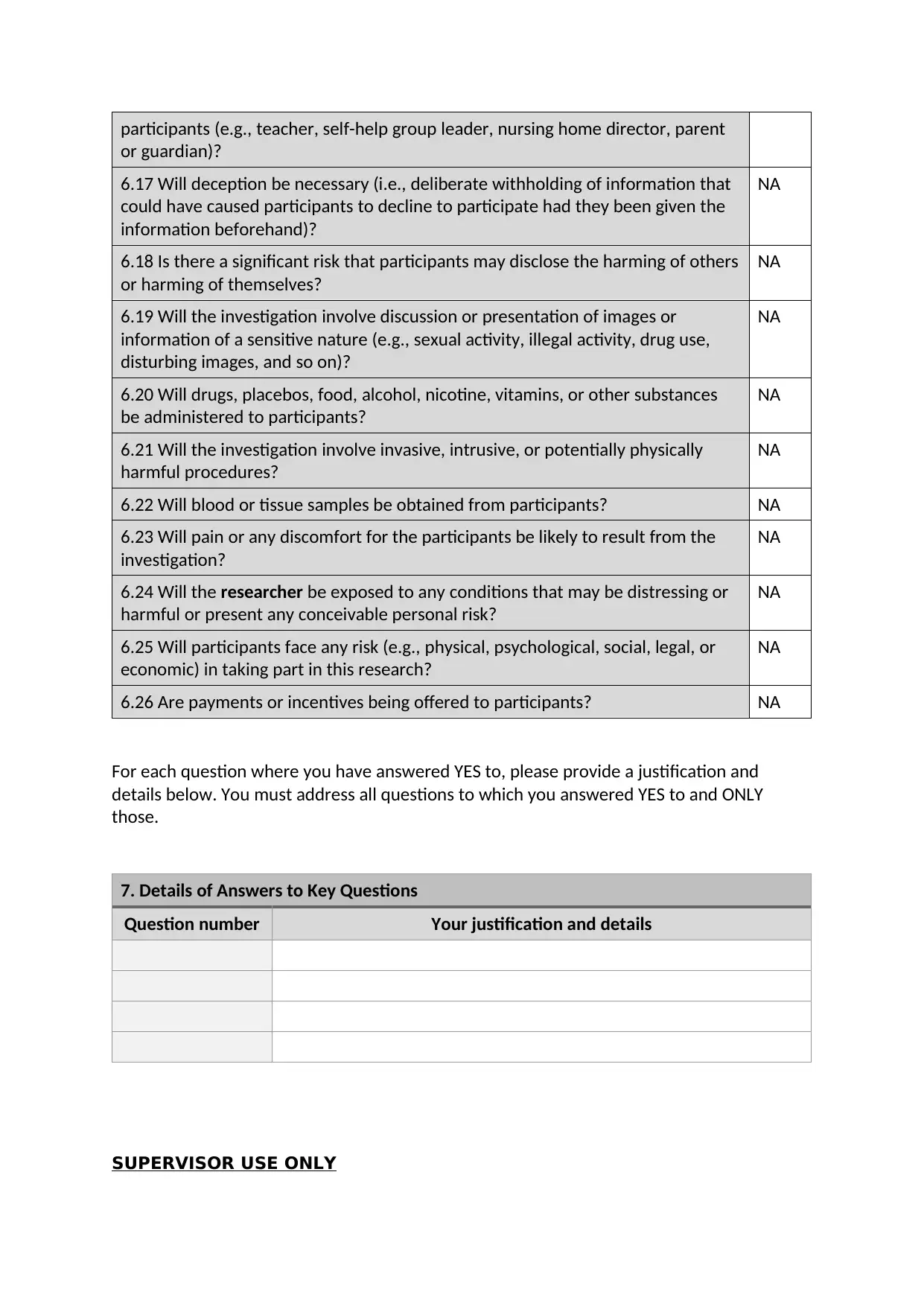
participants (e.g., teacher, self-help group leader, nursing home director, parent
or guardian)?
6.17 Will deception be necessary (i.e., deliberate withholding of information that
could have caused participants to decline to participate had they been given the
information beforehand)?
NA
6.18 Is there a significant risk that participants may disclose the harming of others
or harming of themselves?
NA
6.19 Will the investigation involve discussion or presentation of images or
information of a sensitive nature (e.g., sexual activity, illegal activity, drug use,
disturbing images, and so on)?
NA
6.20 Will drugs, placebos, food, alcohol, nicotine, vitamins, or other substances
be administered to participants?
NA
6.21 Will the investigation involve invasive, intrusive, or potentially physically
harmful procedures?
NA
6.22 Will blood or tissue samples be obtained from participants? NA
6.23 Will pain or any discomfort for the participants be likely to result from the
investigation?
NA
6.24 Will the researcher be exposed to any conditions that may be distressing or
harmful or present any conceivable personal risk?
NA
6.25 Will participants face any risk (e.g., physical, psychological, social, legal, or
economic) in taking part in this research?
NA
6.26 Are payments or incentives being offered to participants? NA
For each question where you have answered YES to, please provide a justification and
details below. You must address all questions to which you answered YES to and ONLY
those.
7. Details of Answers to Key Questions
Question number Your justification and details
SUPERVISOR USE ONLY
or guardian)?
6.17 Will deception be necessary (i.e., deliberate withholding of information that
could have caused participants to decline to participate had they been given the
information beforehand)?
NA
6.18 Is there a significant risk that participants may disclose the harming of others
or harming of themselves?
NA
6.19 Will the investigation involve discussion or presentation of images or
information of a sensitive nature (e.g., sexual activity, illegal activity, drug use,
disturbing images, and so on)?
NA
6.20 Will drugs, placebos, food, alcohol, nicotine, vitamins, or other substances
be administered to participants?
NA
6.21 Will the investigation involve invasive, intrusive, or potentially physically
harmful procedures?
NA
6.22 Will blood or tissue samples be obtained from participants? NA
6.23 Will pain or any discomfort for the participants be likely to result from the
investigation?
NA
6.24 Will the researcher be exposed to any conditions that may be distressing or
harmful or present any conceivable personal risk?
NA
6.25 Will participants face any risk (e.g., physical, psychological, social, legal, or
economic) in taking part in this research?
NA
6.26 Are payments or incentives being offered to participants? NA
For each question where you have answered YES to, please provide a justification and
details below. You must address all questions to which you answered YES to and ONLY
those.
7. Details of Answers to Key Questions
Question number Your justification and details
SUPERVISOR USE ONLY
Paraphrase This Document
Need a fresh take? Get an instant paraphrase of this document with our AI Paraphraser
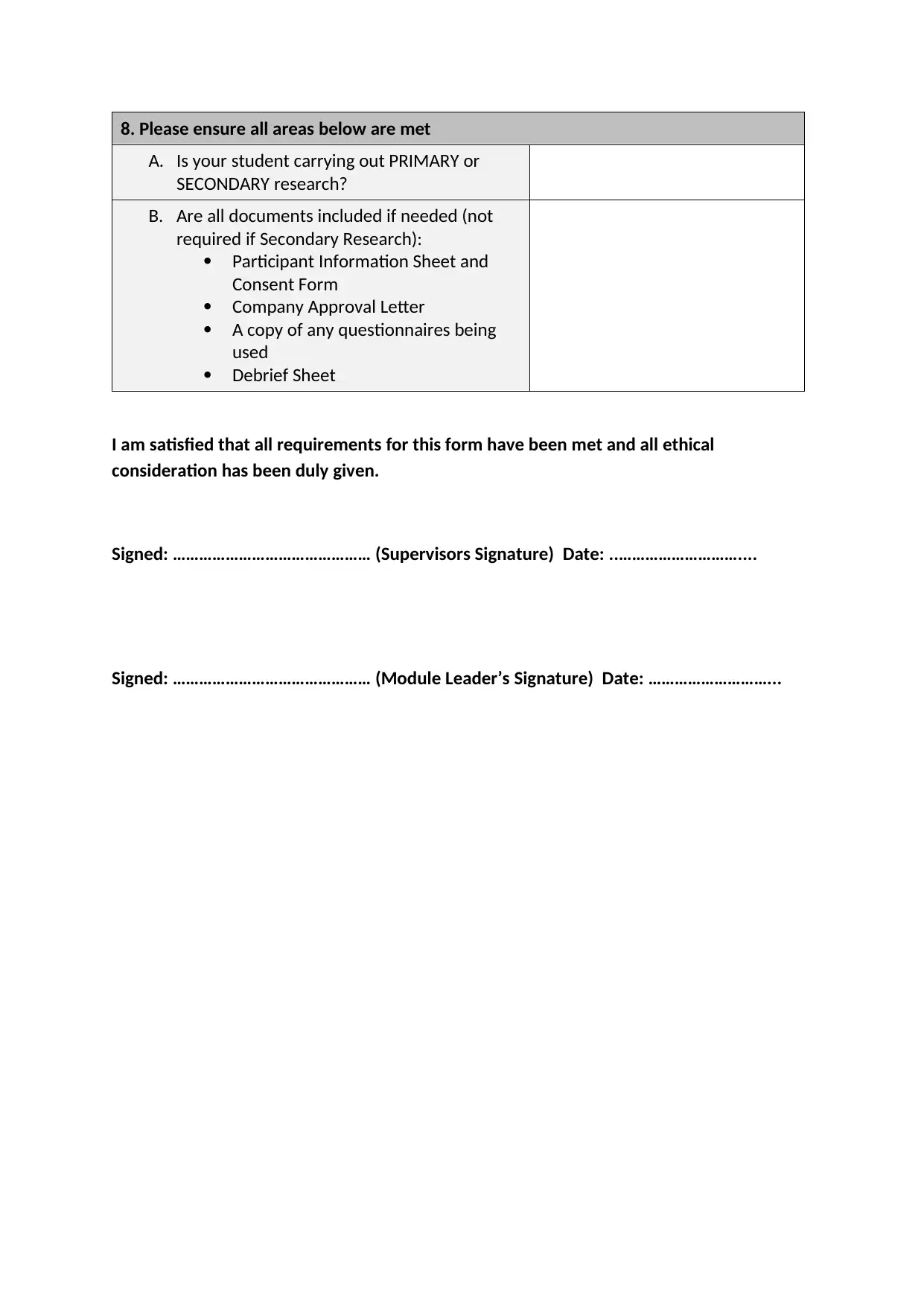
8. Please ensure all areas below are met
A. Is your student carrying out PRIMARY or
SECONDARY research?
B. Are all documents included if needed (not
required if Secondary Research):
Participant Information Sheet and
Consent Form
Company Approval Letter
A copy of any questionnaires being
used
Debrief Sheet
I am satisfied that all requirements for this form have been met and all ethical
consideration has been duly given.
Signed: ……………………………………… (Supervisors Signature) Date: ..………………………....
Signed: ……………………………………… (Module Leader’s Signature) Date: ………………………...
A. Is your student carrying out PRIMARY or
SECONDARY research?
B. Are all documents included if needed (not
required if Secondary Research):
Participant Information Sheet and
Consent Form
Company Approval Letter
A copy of any questionnaires being
used
Debrief Sheet
I am satisfied that all requirements for this form have been met and all ethical
consideration has been duly given.
Signed: ……………………………………… (Supervisors Signature) Date: ..………………………....
Signed: ……………………………………… (Module Leader’s Signature) Date: ………………………...
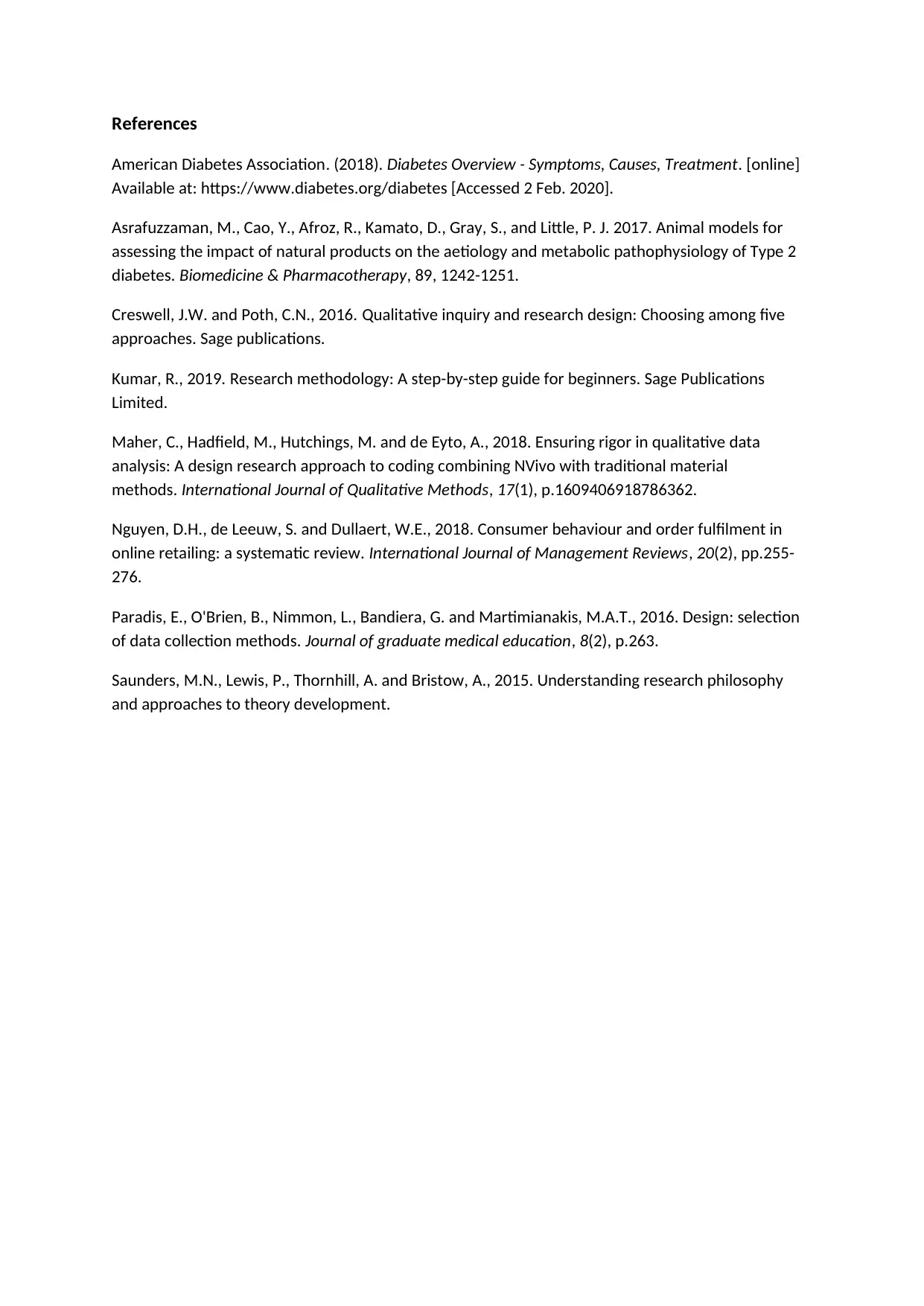
References
American Diabetes Association. (2018). Diabetes Overview - Symptoms, Causes, Treatment. [online]
Available at: https://www.diabetes.org/diabetes [Accessed 2 Feb. 2020].
Asrafuzzaman, M., Cao, Y., Afroz, R., Kamato, D., Gray, S., and Little, P. J. 2017. Animal models for
assessing the impact of natural products on the aetiology and metabolic pathophysiology of Type 2
diabetes. Biomedicine & Pharmacotherapy, 89, 1242-1251.
Creswell, J.W. and Poth, C.N., 2016. Qualitative inquiry and research design: Choosing among five
approaches. Sage publications.
Kumar, R., 2019. Research methodology: A step-by-step guide for beginners. Sage Publications
Limited.
Maher, C., Hadfield, M., Hutchings, M. and de Eyto, A., 2018. Ensuring rigor in qualitative data
analysis: A design research approach to coding combining NVivo with traditional material
methods. International Journal of Qualitative Methods, 17(1), p.1609406918786362.
Nguyen, D.H., de Leeuw, S. and Dullaert, W.E., 2018. Consumer behaviour and order fulfilment in
online retailing: a systematic review. International Journal of Management Reviews, 20(2), pp.255-
276.
Paradis, E., O'Brien, B., Nimmon, L., Bandiera, G. and Martimianakis, M.A.T., 2016. Design: selection
of data collection methods. Journal of graduate medical education, 8(2), p.263.
Saunders, M.N., Lewis, P., Thornhill, A. and Bristow, A., 2015. Understanding research philosophy
and approaches to theory development.
American Diabetes Association. (2018). Diabetes Overview - Symptoms, Causes, Treatment. [online]
Available at: https://www.diabetes.org/diabetes [Accessed 2 Feb. 2020].
Asrafuzzaman, M., Cao, Y., Afroz, R., Kamato, D., Gray, S., and Little, P. J. 2017. Animal models for
assessing the impact of natural products on the aetiology and metabolic pathophysiology of Type 2
diabetes. Biomedicine & Pharmacotherapy, 89, 1242-1251.
Creswell, J.W. and Poth, C.N., 2016. Qualitative inquiry and research design: Choosing among five
approaches. Sage publications.
Kumar, R., 2019. Research methodology: A step-by-step guide for beginners. Sage Publications
Limited.
Maher, C., Hadfield, M., Hutchings, M. and de Eyto, A., 2018. Ensuring rigor in qualitative data
analysis: A design research approach to coding combining NVivo with traditional material
methods. International Journal of Qualitative Methods, 17(1), p.1609406918786362.
Nguyen, D.H., de Leeuw, S. and Dullaert, W.E., 2018. Consumer behaviour and order fulfilment in
online retailing: a systematic review. International Journal of Management Reviews, 20(2), pp.255-
276.
Paradis, E., O'Brien, B., Nimmon, L., Bandiera, G. and Martimianakis, M.A.T., 2016. Design: selection
of data collection methods. Journal of graduate medical education, 8(2), p.263.
Saunders, M.N., Lewis, P., Thornhill, A. and Bristow, A., 2015. Understanding research philosophy
and approaches to theory development.
⊘ This is a preview!⊘
Do you want full access?
Subscribe today to unlock all pages.

Trusted by 1+ million students worldwide
1 out of 9
Related Documents
Your All-in-One AI-Powered Toolkit for Academic Success.
+13062052269
info@desklib.com
Available 24*7 on WhatsApp / Email
![[object Object]](/_next/static/media/star-bottom.7253800d.svg)
Unlock your academic potential
Copyright © 2020–2025 A2Z Services. All Rights Reserved. Developed and managed by ZUCOL.





